Month 9:15, Week 2:7 (Shibi'i/Sukkot), Year:Day 5945:251 AM
2Exodus 8/40
Gregorian Calendar: Friday 19 November 2021
Book of Revelation II
The Apocalypse Beatitudes - Part B
"Read the Words of the Prophecy Out Aloud!"
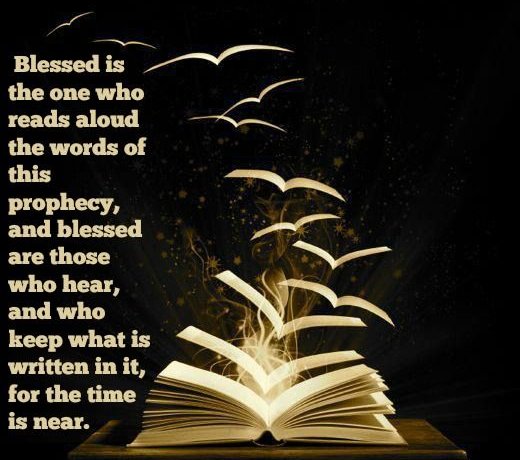
Continued from Part 2
Introduction
Shabbat shalom kol beit Yisra'el and Mishpachah, welcome back to this series of talks on the Book of Revelation and to the second part of our study of the seven Apocalypse Beatitudes.
Resumé
Last week we looked at all the other Beatitudes in both the Old and New Testaments of which there are a considerable number, including the 9 chief ones in the Saviour's Sermon on the Mount and Sermon on the Plain, and several others of Messiah's and the apostles dotted around the place, all of which we read through, not to mention many in the Tanakh (Old Testament) from which we selected Psalm 1 and a passage from Daniel 12 as representative. You will recall that a beatitude contains a condition and a promise which results in a 'blessed' or 'happy' state of being both now, but also principally in the future at the time of the resurrection of the just at the beginning of the Millennium. We ended our study by reciting the 7 Apocalypse Beatitudes in the Book of Revelation without makinging any real commentary. I'm hoping some of you have had time to re-read them, contemplate them, and read around them for context, and to have asked yourselves some important questions as to their purpose like, 'Why are they here in this particular book in the form that they are?'
Date of Composition
Unlike the 9 Beatitudes in the Sermon on the Mount which are related one after the other like a sudden burst of machine gun fire, the 7 in the Book of Revelation are well spread out, with only the last two being within earshot of one another. Also importantly, the Sermon on the Mount was told by the mortal Messiah whereas the Apocalypse Beatitudes were spoken in John's vision by the resurrected, glorified Messiah, many years after His ascension into Heaven, and as we shall see Him when we meet Him. Though there is a good case for the Book of Revelation having been written before the destruction of the Temple in 70 AD [1], most conservative scholars hold the view that it was written nearly 30 years later toward the very end of the first century around the time of the terrible persecutions of Roman Emperor Domitian (AD 81-96). So we're talking about 60+ years after the cross and around 30 years after the martyrdom of Paul in Rome (ca. AD 65).
A Book for All Times
A whole new generation has arisen since those who lived in the period of the Book of Acts. The 'honeymoon' time, as it were, of the first wave of evangelistic enthusiasm following the first Messianic Shavu'ot (Ekatost, 'Pentecost') has died down and the early believers are having to adjust to the reality of a life filled with waves of vicious persecution by hostile pagan Roman emperors who wished to be worshipped as 'Lord'. Believers had to choose between the Emperor and Christ. Today the State increasingly demands our worship, obedience and compliance to its dictats. The Book of Revelation was written chiefly for those experiencing persecution and martydom yet its message is clearly for all believers in any kind of crisis. Like all New Testament Scripture, it's both for the first century Christians/Messianics and for all believers "until the end of the æon (age)" (Mt.28:20). Nevertheless the 7 Apocalypse Beatitudes can only be properly understood in the context of the first century which means we must have a solid historical grounding.

1. The First Apocalypse Beatitude - Read It Out Aloud!
So let's dive in with with first Apocalypse Beatitude which I have made the sub-title of today's sermon both because it's chronolically the first but also because in a way it sets the tone for all the others that follow it. As I mentioned last week, I'll be reading from the Catholic Revised New American Bible (RNAB) which I chose not because it's necessarily better than other versions (though I actually think it's quite a good one) but it just happened to be the version I had near at hand when I first began my own research into this topic, plus I want to encourage my listeners and readers to study a wide range of translations as did the makers of the famous King James Version:
- 1. "Blessed is the one who reads aloud and blessed are those who listen to this prophetic message (Book of Revelation) ['to the assembled people' - Barclay] and heed ('keep' - NRSV, HRV) what is written in it, for the {appointed} time is near" (Rev.1:3, RNAB).
A Book Hated by the Reformers
This beatitude instructs us not only to read the Book of Revelation privately but to read it aloud both to fellow believers in assembly and as a prophetic proclamation to everyone who will listen to its message. This is the only book in Scripture which tells us it is to be proclaimed audibly from beginning to end because it is Yahweh's anouncement to mankind and to the whole world of what He is going to do so that no one will be able to say he is ignorant of what is coming or what he must do in order to get his life in order having read it. This book is to be spoken out aloud, it is to be preached and absolutely not ignored as John Calvin did, and certainly never questioned as to its authenticity as the great reformers Luther and Zwingli did. And even though this book is about persecution and martyrdom, as those to whom this was originally given were painfully experiencing, it also says something quite extraordinary: "Blessèd is the one who reads the words of this prophecy, and blessèd are those who hear it and take to heart what is written in it" (Rev.1:3, NIV). To ignore it or just skim it is to therefore not only to be disobedient but to potentially forfeit huge blessings both now and in eternity too.
The State of Blessedness - What is It?
Now I need to explain what this word "blessed" means at a deeper level. It means far more than being happy because happiness is an emotion which is often dependent on outward circumstances...and the circumstances of persecution and martyrdom are hardly conducive to what we ordinarily or typically call 'happiness'. This particular kind of 'happiness' describes the ultimate well-being and distinctive spiritual simcha or joy of those who share in the salvation of the Kingdom of Elohim (God) that comes about through being "poor in spirit" (Mt.5:3, NKJV) (Sermon on the Mount Beatitude #1) and "persecuted for righteousness' sake" (v.10, NKJV) (Sermon on the Mount Beatitude #8) - remember the promises of these two (being poor in spirit or utterly dependent on Yahweh, and suffering persecution for Messiah's sake) are to become inheritors of the Kingdom! The Book of Revelation specifically takes up the theme of the 8th and 9th Sermon-on-the-Mount Beatitudes, as does Peter in his two beatitudes when he speaks of the blessedness of "suffering for righteousness' sake" and the blessedness of being "reproached ('reviled' - NRSV, 'insulted' - JNT/CJB, NLT) for the Name of Christ" (1 Peter 3:14; 4:14, NKJV).
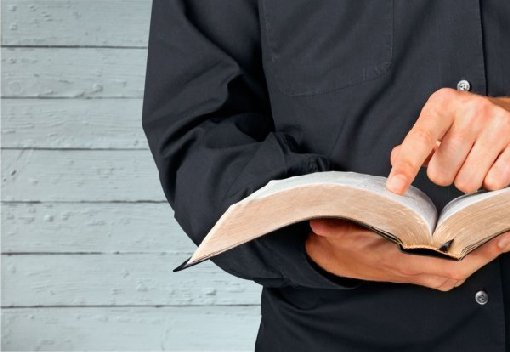 Read it out aloud!
Read it out aloud!
The Favoured are Commonly Persecuted
Now you may not believe this when it happens because it seems so contradictory when we view happiness as the world views it, but this first Apocalypse Beatitude is actually describing the favourable circumstances Yahweh has put a person in - you and me - even if we are being persecuted and killed for our faith! How can it possibly be 'favourable'? Because we are being blessed to eternal life on account of the inner shalom or peace the Ruach haQodesh (Holy Spirit) gives us both here and now and, even more importantly, throught the æons (ages) to come. There are many, many wonderful promises Yahweh has made to, and for, those willing to suffer for His Name's sake. That kind of faithfulness and loyalty is powerful.
The Inspired Utterance of Prophecy
Notice that the Book of Revelation is specifically called and identified as a "prophecy" [2]. The writer, John the apostle, is also a navi or prophet in the Tanakh or Old Testament sense - quite clearly - since all his utterances proceeed from the illumination of the Ruach (Spirit) [3]. Paul confirms that apostles can (and, in my understanding of Scripture), should be nevi'im (prophets) too (Eph.3:3f.), just as they must also be competent teachers. Theirs is a threefold office. Bear in mind that 'prophecy' includes not only foretelling the future (which this book does copiously and in great detail) but also proclaiming any davar (word) from Elohim (God) - whether it be a command, an instruction, history or a prediction. All of Yahweh's Davar or Word is to be proclaimed! We are to teach it, proclaim it out aloud, disseminate it, and basically get it out into the world for all to be blessed by it, if they will listen and respond affirmatively.
Investing for Eternity
So a 'blessed' person, in the widest possible sense, possesses the happy condition of one who reveres Yahweh and does His will [4] by putting his whole trust in Him [5]. Such a one will be the recipient of much glory in the eternities. This is a theme we find repeated over and over again in Scripture because true believers always choose long-term investments ahead of any short-term ones. We are looking far, far down the road, in the same way that someone entering a marriage covenant does so with a mind to staying the course 'until death do us part' or indeed better, into the eternities [6].
The Time is Near - He is Coming Soon
Finally, what does the concluding remark, "for the time is near" mean? Several times in the Book of Revelation Yah'shua (Jesus) says, "I am coming soon", even concluding the prophecy with these words (Rev.3:1; 11:14; 22:7,12,20). But just how 'soon' is that, given this book was written just under 2,000 years ago? I think we can best understand what is meant by considering the apostle James' explanation for you must remember the ancients viewed time cyclically and not just linearly as we nearly exclusively do:
"Be patient, then, brothers, until the Master's coming. See how the farmer waits for the land to yield its valuable crop and how patient he is for the autumn and spring rains. You too, be patient and stand firm ('strengthen your hearts' - NRSV) because the Master's coming is near. Don't grumble against each other, brothers, or you will be judged. The Judge is standing at the door!" (James 5:7-9, NIV).
The Parousia
Just as there is 'final judgment' to come, so too there this ongoing judgment in the here-and-now. The Greek word parousia which we commonly render as "coming" principally carries the sense of 'presence'. Thus the one 'coming' may be said to be physically arriving at a time in the future and yet is present in a spiritual sense right now too. Many Hebrew concepts have both a present and a future sense. When James says, "the Judge is standing at the door", he is, of course, talking about the Second Coming and the Final Judgment. But the Judge doesn't only judge at the end - He is judging now in the Penultimate Judgment as I now speak but He has also judged throughout history, but none of these were, or are, the Final Judgment. He judged the Soviet Union in 1991, Napoleonic France in 1815 and Nazi Germany in 1945, to give three recent examples, and He judged many of those individuals involved in attrocities back then too. There is both personal and corporate judgment, remember - the judgment of individuals and nations but in the abstract and as collectives of literal people.
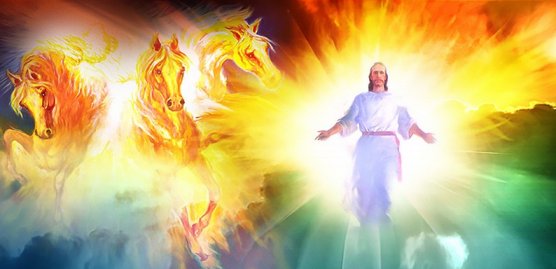 The parousia or second coming of Christ
The parousia or second coming of Christ
The Last Days Began With the Incarnation
Remember also that the Messianic Scriptures (New Testament) clearly teach that the "last days" began at the Incarnation of Yah'shua (Jesus) and not, as many wrongly suppose, in the last few months or years of this dispensation. So judgment has been 'imminent' or 'soon' ever since Elohim (God) took on human flesh as the baby Yah'shua (Jesus). This very act served notice to the world that the end had indeed begun. And we have been living in the 'last days' of what has been, after all, a very long history of planet earth. The Bible does not tell us the year the Second Coming will take place, only the time of the year, i.e. during the as yet unfulfilled autumn festivals. And for the last 2,000 years believers have been admonished to watch out for the Master's return as diligent watchmen, being constantly on the alert, discerning the signs of the times. Yes, many - if not most - of the first believers in their understandable enthusiasm following the astonishing miracles of the resurrection and the outpouring of the Ruach (Spirit) in Jerusalem hoped and believed Yah'shua (Jesus) would arrive in their own generation, and undoubtedly many were disappointed when He didn't, but this all came about as the result of a misunderstanding of a saying of Yah'shua (Jesus) (e.g. Mt.24:34; Mk.13:30; Lk.12:32) which I have explained in depth elsewhere. And as you are about to see, nearly all the Apocalypse Beatitudes are in some way connected to this theme of the Second Coming so we will be able to examine them a little more quickly.

2. The Second Apocalypse Beatitude - the Workers of Torah
As we saw last week in looking at a number of beatitudes from around the Bible, obedience to the mitzvot (commandments) or the Torah figures very strongly in the Book of Revelation and no more so than in the next Apocalypse Beatitude:
- 2. "Here is what sustains the qadosh (holy, set-apart) ones who keep Elohim's (God's) mitzvot (commandments). Blessed are the dead who die in the Master (Lord) from now on...let them find rest from their labours, for their works accompany them" (Rev.14:12-13, RNAB).
 The commandments are extensive, and comprehensive but never optional
The commandments are extensive, and comprehensive but never optional
The Problem With Antinomianism
Since this is a very strong rebuke against antinomians - those who believe we should vaguely just follow the 'Spirit' (usually understood by those not fully regenerated to be subjective mental and emotional impressions because they are led by spirits rather than by the Spirit or Ruach) because they mistakenly believe the Law (Torah) has been abolished altogether and 'rules' are a burdensome thing for their liberal minds [7] - we should not be surprised to discover that Luther, Zwingli and Calvin all hated the Book of Revelation and did not believe it was authentic [8]. Nor should we be surprised to find some Protestant commentaries hopping over verse 12 (like The NIV Study Bible, cited at the end of this study).
A Key Identifying Mark is Obedience to Torah
Yet here, in this Apocalypse Beatitude, which is preceded by an admonition once again for "patient endurance" in times of tribulation (Rev.14:12, NIV), the resurrected Saviour in all His glory, long after the 'Day of Pentecost' (so-called) tells the apostle John that an identifying mark of the martyr-qodeshim or saints (holy, set-apart ones), and those faithful ones in general, is their Torah-obedience (their commandment-keeping) and that their good works or deeds accompany them into the next world as credit from this one for the distribution and reception of great rewards (not, I hasten to add, for the reception of salvation which is by emunah/faith, not the good things we do). The deeds of the faithful dead are evidence not only that they are saved [9] but of the kind of saved people they are, namely, the children of the first resurrection (Rev.20:5-6 - also see Apocalypse Beatitude #5 below) as opposed to the second, as we shall see as we get deeper into our study of the Book of Revelation.

3. The Third Apocalypse Beatitude - Keep Your Clothes With You!
The third Apocalypse Beatitude is all about preparedness and it's surprising just how misunderstood it is. It is added as a kind of footnote which is why it appears in (parentheses):
- 3. "('Behold, I am coming like a thief'. Blessed is the one who watches and keeps his clothes ('garments' - ESV) ready, so that he may not go naked and people see him exposed)" (Rev.16:15, RNAB)
This verse is misread by many believers who teach that nobody knows when the Saviour is returning because He is coming unexpectedly "like a thief" - and thieves never announce what they are about to do so as to avoid detection and capture. But that isn't what Yah'shua (Jesus) says as He points out earlier in the third chapter:
"If you are not watchful, [then] I will come like a thief, and you will never know what hour I will come upon you" (Rev.3:3, RNAB)
- i.e. 'if you are watchful, then I won't come like a thief (i.e. you'll anticipate My arrival), and you will know what hour I will come upon you!'
The Master Only Arrives Unexpectedly to Those of the World
In other words, Yah'shua (Jesus) is returning unexpectedly to the world (unbelievers and disobedient, unprepared believers...children of the Second Resurrection) which is unprepared for its judgment because it isn't watching out because it is living in sin and rebellion against Yahweh's mitzvot (commandments)! For them - that's to say, the unbelievers - it will be exactly like a thief turning up and despoiling them when they least expect it as calamity impacts them left, right, and centre. By contrast, Messiah says that true believers will be watchful and, in an interesting expression, "keep his clothes ready, so that he may not go naked and people see him exposed" because that is exactly how the unbelievers and the disobedeient believers will experience His Second Coming...embarrassed and horrified because of their exposure and nakedness.
To Be Clothed Rightly
The "clothes" or "garments" are not any old clothes but specifically "white garments" (Rev.3:18, ESV), and specifically "unsoiled" white garments (v.5, ESV). Who gets white garments according to the Book of Revelation? "the one who conquers (overcomes) will thus be clothed in white garments, and I will never blot his name out of the Sefer Chayim (Scroll/Book of Life - Dan.12:1)" (Rev.3:5, ESV). In other words, to be caught "naked" is to be caught without ones spiritual clothes on which represent purity in Christ that only comes by overcoming the fleshy, carnal, Adamic nature, which is another way of saying the soul's total surrender and obedience to Yah'shua the Messiah (Jesus Christ) who imparts this covering by means of the shed blood of the Cross. To not be an overcomer or "conqueror" is to be outside, or excluded from, the Kingdom such that when the King (Yah'shua/Jesus) returns that person will no longer be protected but instead be fully exposed to His judgment, not just in the flesh (i.e. in terms of life on earth) but more importantly in the spirit, which, broadly-speaking, will determine whether he/she is 'heaven-' or 'hell-bound'.
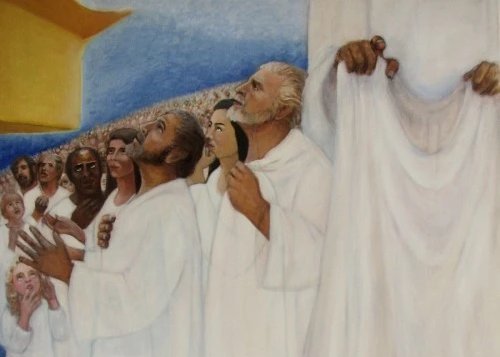 The white garments the saints receive is the righteousness of Christ
The white garments the saints receive is the righteousness of Christ
Our Spiritual Covering
So this is a deadly serious matter. If we are not clothed in the righteousness of Christ though faith/trusting and self-surrender to Messiah leading to spiritual regeneration leading to spontaneous Torah-obedience (which is the evidence of the trusting, surrendering one thus saved) then we are in serious trouble. That means, according to the overall theme of the Book of Revelation, a willingness to suffer or be persecuted for Messiah's sake and, if necessary, to die for Him rather than deny Him as so many early believers did at the hands of murderous pagan Roman Emperors and as they are doing today in places around where there is fierce persecution (Nigeria, Middle East, pakistan, etc.). That's what it means to be wearing white clothes when Messiah returns whether you're alive on the earth when He returns or whether you return with Him freshly resurrected from the world of spirits. It's our covering, purchased by the blood shed at Calvary. We should all be wearing those clothes now now because none of us knows when we will be taken home. How we arrive - clothed or naked - is how we shall always be. A sobering thought.

4. The Fourth Apocalypse Beatitude - Called to the Wedding Feast
We now come to the fourth Apocalypse Beatitude:
- 4. "Then the malak (angel) said to me, 'Write this. Blessed are those who have been called to the wedding ('marriage' - AENT) feast ('supper' - ESV) of the Lamb.' And he said to me, 'These words ('sayings' - AENT) are true: they come from Elohim (God)'" (Rev.19:9, RNAB).
Marriage and wedding imagery are used a great deal throughout the Bible to represent the intimate union between Yahweh and His faithful followers. It's a powerful allegory for there is nothing quite so deep in human relationships as a properly functioning marriage. Two verses earlier "the wedding day of the Lamb" is announced because "His bride has made herself ready" (Rev.19:7, ESV). As anyone who has had a traditioinal wedding knows, a great deal of preparation (not to mention expense) goes into preparing a wedding. This one - the allegorical wedding between Yah'shua (Jesus) the Bridegroom, and the qodeshim (saints, set-apart ones) who have kept their white clothes through faithfulness, purity, obedience and sacrifice (that includes being willing to be persecuted and even die for the Bridegroom or "Lamb" if necessary) - depicts a 2,000 year-old uni-plural or spiritual 'polygamous' Community of faithful Ones, along with all those faithful ones in the Old Covenant who lived and served before the New Covenant. They are finally ready for the Big Day.
The Corporate Bride
This is not a personal wedding but a communal, corporate or family one because the Messianic Bride ('Church') consists of many souls - believers from across the centuries and millennia from every nation, kindred and tongue...those who have died beforehand and are in the spirit world (heaven) and those who are alive at His parousia or Coming. All are raised or resurrected at the same time, that is to say, those overcomers who exclusively belong to the First Resurrection are because of, first, their faith/trusting in Messiah, and second, their Torah works of obedience that flow out in appreciative love for the Saviour. It is a blessed, happy, wonderful, joyful thing to be called to this Wedding. And now the "white garment" is 'upgraded', as it were, as the corporate works of the qodeshim (saints, set-apart ones) are 'added' to the Bride's glory, for verse 8 says, "She was allowed to wear a bright, clean linen garment"...and then in parentheses, "(The linen represents the righteous deeds of the qodeshim/holy ones/saints)" (Rev.19:8, ESV).
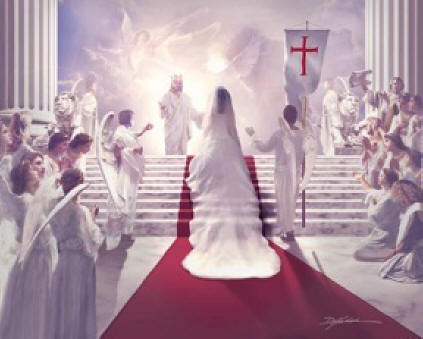 The corporate, uniplural, many-in-one bride at the Wedding Feast of the Lamb
The corporate, uniplural, many-in-one bride at the Wedding Feast of the Lamb
The Necessity of Good Works
Once again we see the importance of good works - Torah-compliant and therefore kosher or clean, pure works - in the complimentary make-up of the Bride, the faithful ones. In effect, you will 'wear' what you have done in mortality. Without salvation by grace through faith (Eph.2:8), of course, these works cannot be credited or incorporated into the wedding dress - they are the evidence of trusting the Bridegroom and expressing love for Him by doing works of righteous service. There is a point to these deeds after all even though the antinomians - the Torah-denying ones - refuse to accept this. Not that we can possibly ever compute or calculate the 'exchange rate' nor should we attempt to do so because love keeps no record of what it gives - it simply gives, and gives some more, for the shere pleasure and joy of giving. But Yahweh notes every loving deed and incorporates it into the corporate wedding dress.

5. The Fifth Apocalypse Beatitude - Sharing in the First Resurrection
Most Protestants don't believe there is more than one category of believer and the Calvinists certainly don't because they don't even believe we have authentic free will to either have faith or do good works, and they certainly don't believe, as fatalists and 'hyper-gracers', that these good works are credited to us at the end either. Yet there is no debate as to the reality of there being two resurrections and that many (most) professing Christians and Messianics, who refuse to become overcomers, will find themselves in the second one alongside the unbelievers. Yet there are two resurrections and three categories of person and only the overcoming Bride arrayed in fine linen, as we have seen, is called to the First Resurrection and the Wedding Feast of the Lamb:
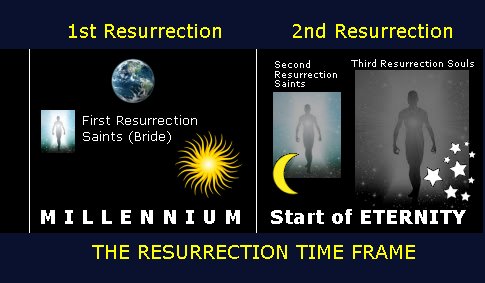
Therefore the fifth Apocalypse Beatitude says:
- 5. "Blessed and qadosh (holy, set-apart) is the one who shares in the first resurrection. The second death has no power over these; they will be cohenim (priests) of Elohim (God) and of Messiah (Christ), and they will reign with Him for [the] thousand years (Millennium)" (Rev.20:6, RNAB)
To be blessed here is for multiple reasons:
- 1. Firstly, to be raised in the first resurrection to enjoy the Millennium - the other believers, and unbelievers, remain disembodied spirits for another millennium in their respective places;
- 2. Secondly, the Second Death cannot touch the Bride in any degree; and
- 3. Thirdly, those who are the Bride will become cohenim (priests) and reign with Him for 1,000 years.
Hierarchies in Heaven
Many Christians who make no distinction between first and second resurrection believers (because they assume all those of the second resurrection are unbelievers), conclude that all believers become rulers. But who would they be ruling over if everyone who has ever named the Name of Christ, however disobedient or faithless, suddenly becomes a cohen or priest? That sounds a bit like a South American junta with hundreds of colonels but no privates or ratings. To claim you'd be ruling over someone when everyone is, by this thinking, a 'ruler' makes absolutely no sense whatsoever. That would be like a room full of retired or decommissioned officers having no real power but pretending to be in charge of something simply because they're wearing uniforms displaying rank. Like it or not, however much this may jar against the secular socialist egalistarianism of liberals, both those who are self-declared liberals and those who claim to be 'conservatives' but are, in fact, liberals too (without knowing it), there are hierarchies in Heaven just as their are many glories (1 Cor.15:41). Not all believers go to the same place or inherit the same resurrection after death or when Yah'shua (Jesus) returns.
The Second Death, Hell and Universal Reconciliation
One final point about this particular beatitude: the "second death", which the overcoming Bride wholly escapes, is an eschatological or end-time concept related to punishment of the wicked after mortality, what some call hell which is a huge and controversial concept we can't possibly go into here today - see the sermon series, The Fire of Yahweh. Historically-speaking, the 'second death' is a theological term that that doesn't appear until the Second Temple period and is first mentioned in the Targum Isaiah, an Aramaic paraphrase of the Hebrew Book of Isaiah, which speaks of the "sin [that] will not be forgiven you until you die the second death" (Targum Isa.22:14). It is from this Targum that the word 'Gehenna' is supplied in the Gospel of Mark but the idea of a "second death" is only to be found in the Book of Revelation (2:11; 20:6; 20:14; 21:8) which we'll tackle later on in this course. In the meantime, I recommend those who would like to make some advance preparation to take a look at our Hell and Universal Reconciliation websites because there is so much confusion in Christendom over this particular doctrine on the fate of the wicked. Suffice to say, the 'second death' is a process and neither 'eternal punishment' nor 'annihilationism'.

6. The Sixth Apocalypse Beatitude - Keep the Prophetic Message!
We're have now arrived at the last chapter of the Book of Revelation where we find the last of the two Apocalpyse Beatitudes. The sixth one again reminds us that the Saviour is "coming soon" in the prophetic timeline, as we saw in the first Beatitude:
- 6. "Behold, I am coming soon. Blessed is the one who keeps the prophetic message ('words' - ESV) of this book [of Revelation]" (Rev.22:7, RNAB).
Once again we have a timeless promise for believers in all generations and in every age - obedience to the instructions ensures a state of blessedness. 'Trust and obey, for there's no other way' as the hymn goes.
 Keep the prophetic message!
Keep the prophetic message!

7. The Seventh Apocalypse Beatitude -
The Right to the Tree of Life & the New Jerusalem
Finally, we come to the very last of the Apocalypse Beatitudes, the final benediction of the set, as it were, where, for the third time no less, our attention is drawn to our prophetic, spiritual robes, garments or clothes which we are responsible for keeping washed, which in effect means living out the mandated lifestyle consciously, proactively, getting the stain of sin out of our lives through the practice of daily repentance and reformation, in the power of Christ, as is taught us by the symbolism of the week-long annual festival of Chag haMatzah or the Feast of Unleavened Bread each spring. This is the practical maintenance of our salvation because there is no such thing as the Calvinist 'Once Saved, Always Saved' notion, no 'Once Washed, Always Washed' that a large segment of the Evangelical Church falsely teaches, because this beatitude of the resurrected Christ, taken together with everything else that is taught about the subjects of salvation and sanctification in the Bible, utterly repudiates such an idea. We are therefore again reminded to embrace the whole counsel of Scripture and to refrain from cherry-picking those parts of it that we like and ignoring or rejecting the rest. So now, here, in this last Apocalypse Beatitude that I'm about to read out loud to you as instructed in the first beatitude, we see made to us, in addition to the invitation already made to attend the Marriage Feast of the Lamb, as part of the collective Bride, two more equally great promises:
- 7. "Blessed are they who wash their robes so as to have the right to the Etz haChayim (Tree of Life) and enter the [heavenly, qadosh, holy, set-apart] city [of New Jerusalem] through its gates. Outside are the dogs (impure, spiritually unwashed, unregenerated persons), the sorcerers, the unchaste, the murderers, the idol-worshippers, and all who love and practice deceit" (Rev.22:14, RNAB).
The Tree of Life and the New Jerusalem
Once again the surrounding verses speak of rewarding (in the first case) and punishing (in the case of the latter two) of both Messiah's faithful servants, His unfaithful servants and His enemies, "to repay each one for what he has done [in mortality]" (Rev.22:12, ESV; cp. Rom.6:23), granting the right of access of the faithful to the Tree of Life and entrance to the New Jerusalem, the abode of the Blessed, through one of the 12 gates assigned to each of the 12 Israelite Tribes, again reminding us that the New Covenant is not any 'Church' system but Torah-obedient Messianic Israel. The rest - the unfaithful, the unbelieving - are assigned a place 'outside' the city of New Jerusalem, a location and state-of-being described elsewhere in the Book of Revelation in very symbolic terms so it is not immediately clear whether this is a literal, physical city that will be placed on the real estate currently occupied by the modern Jerusalem, or whether it points to the entire millennial earth prior to its complete transformation, or to a spiritual reality difficult to explain in any other way. All three are likely true.
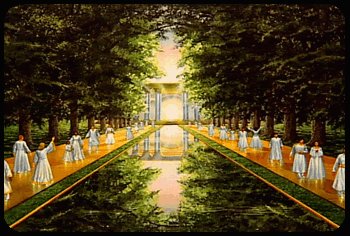 The Tree of Life in the New Jerusalem
The Tree of Life in the New Jerusalem
Things Yet to Unpack Further
We will be unpacking all of this as we work our way through the course because there are so many levels of reality in this text. This will include an in-depth understanding of what the "Tree of Life" is because this is such a rich symbol (Gen.2:9; 3:22,24; Prov.3:18; 11:30; 13:12; 15:4) which in the Book of Revelation not only bears 12 crops of fruit, one crop of fruit each month, (Rev.22:2) but is mysteriously and simultaneously planted on both sides of the "river of life" that flows down from Yahweh's Throne, clearly representing a reality that is impossible to fathom on our plane of physical reality and which can only then, therefore, be explained using such symbolism. It's "leaves are for the healing of the nations" (Rev.22:2b). Yet only "to him who overcomes (conquers his flesh)" will Christ "give the right to eat from the Etz haChayim (Tree of Life), which is in the paradise of Elohim (God)" (Rev.2:7, NIV). And then, right at the very end Yah'shua (Jesus) warns:
"And if anyone takes words away from this book of prophecy, Elohim (God) will take away from him his share in the Etz haChayim (Tree of Life) and in the qadosh (holy, set-apart) city, which are described in this book [of Revelation]" (Rev.22:19, NIV).
Sobering Truth for All Professing Believers
Maybe, then, these Apocalypse Beatitudes, along with the rest of the Book of Revelation, are rather important - don't you think - if so much is at stake? May these truths make us all the more sober in our spiritual walk and discipleship. For
one thing is made absolutely clear, again, in this last beatitude: the impure ("dogs"), those without the white robes, without consciences washed clean by the precious blood of Messiah shed for them at Calvary - Rev.7:14; Heb.9:14), the "sorcerers" (the occultists, magicians, clairvoyants, wizzards, witches, warlocks, diviners, freemasons, Illuminati, remote-viewers, wiccans, satanists, and devil-worshippers whose pagan arts are anathema in Torah, the practice of which leads to spiritual death), the "unchaste" ('sexual sinners' - AENT, 'sexually immoral' - ESV, the fornicators, adulterers, pedophiles, etc.), the "murderers", the "idol-worshippers" ('idolaters' - AENT, ESV, those who put anything ahead of Yahweh in their lives), and all who revel in "practicing deceit" ('anyone who loves and does/practices falsehood' - AENT/ESV) - all of these are headed for the lake of fire and the "second death", be they professing though insincere believer, pagan or atheist. Nowhere here is there any wriggle-room for sinning, and not the slightest hint of that Protestant heresy which says we should sin more so that Elohim's (God's) grace - His undeserved loving kindness - might flow to us the more abundantly. That is one Rasputin-type lie that Yahweh absolutely hates, as spoken of elsewhere in the Book of Revelation.
The Dual Religion That is True Faith
This Book does not mince words. Things are spelled out unambiguously. As with the teaching of the rest of the Book of Revelation, we see a duality that characterises true believers, the Bride with robes washed white: they trust in the Son of Elohim (God) and they obey the Father's Torah. We are reminded of this time and time again. Look at verse 14 of the last chapter:
"Blessed are they who do His (Yahweh's) Mitzvot (Commandments), that they may have a right to the Etz haChayim (Tree of Life) and may enter through the gates into the city" (Rev.22:14, AENT).
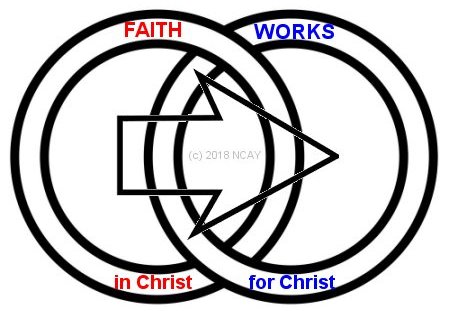 The Bride trusts in Christ and does Torah-works for Christ
The Bride trusts in Christ and does Torah-works for Christ
No Tree of Life for Commandment-Rejecters
Do you get that? The commandment-rejecters, those who just want to follow their feelings and label them as the 'Holy Spirit' do not get to have right of access to the Tree of Life! Trusting in Christ alone beyond the initial saving event isn't enough - it's lifelong obedience with trusting that counts. Any kind of life that is promised you by preachers without the follow-up to faith in Christ that is Torah-obedience leads to a counterfeit life because everywhere in Scripture Yahweh repudiates lawlessness - antinomianism, and especially so in the final witness that is the Book of Revelation and in the Seven Apocalypse Beatitudes that we have been studying these past two weeks. If Luther, Calvin and Zwingli had problems with the Book of Revelation, what does that tell you about the Protestant Reformers and their religion? That they only presented half the Besorah, Gospel or Good News. They got the first part absolutely right but then failed to follow up with the second! They presented to the world the equivalent of a one-sided piece of bread, an impossibility! That is why we aren't just 'evangelicals' but 'messianic evangelicals' because we insist, with the resurrected Yah'shua (Jesus), revealed through the Apostle John, along with the whole counsel of Scripture, that the one is not without the other. It can't be. And this really ought to be common sense but people get so wrapped up in their traditions, complicated, heavy theologies, and their own fleshy natures that they no longer think straight.
The Simplicity of Trust and Obey
This is why I like the Apocalypse Beatitudes so much because they are such powerful, concise summaries of essential, saving doctrine, and it's here I have chosen to start in our study of the Book of Revelation before we plunge into all the mystical and prophetic stuff. In fact what I want to do in the immediate weeks ahead is deal with the plain, exoteric teachings of Revelation first, the things a child can understand and apply to daily living, and to then get into all the prophetic material where so many thousands of private theological boats get born to confuse people and where the emet (truth) commonly capsizes and drowns all those on board these vessels of wrath. You see, this book is both incredibly simple and potentially very complex indeed, so we must discover the simplicity first, which is why I am spelling everything out in monosyllables for you. We must understand it as the ancients did in the first century before all our deviant, confusing Western sophistry gets unnaturally injected into it. And what is that simplicity? Trust Christ with all your soul and obey the mitzvot (commandments) diligently - or as Yah'shua (Jesus) puts it another way in the Book of Revelation, sing the song of Moses (Torah) and the Song of the Lamb (Rev.15:3) - it's a messianic-evangelical duet - it always was and always will be! That's where we start. Any theology that omits either of these two parts will always end up as false and destructive especially in these dangerous times of postmodernist nihilism, relativism and anarchy.

Conclusion
Enough said. Thank you for being patient with me because it was necessary that no stone be left unturned if we are to stay on the strait and narrow in this course. Next week I want to try and give an overview of the whole Book of Revelation - the way it's laid out and its structure because it's easy to get lost in it. This is a gigantic project, so please pray for me, as I cannot possibly do this in my own strength, less so in my weakened condition. Yahweh has already shown me a few visions concerning the more complex, prophetic parts but that's for much later. I just hope I don't forget them when the time comes! Yahweh bless your day, find your sabbath rest, and praise Him, for He deserves always to be praised! Amen.
Continued in Part 4
Endnotes
[1] See Matinée Apocalypse: Delighting in the Way of Yahweh
[2] See the Prophecy website
[3] Revelation 22:7,10; Acts 13:1; 1 Corinthians 12:23; 13:2; 14:3; Ephesians 4:11
[4] Psalm 1:1; 94:12; 112:1; 119:1-2; 128:1; Proverbs 29:18 cp. Psalm 41:1; 106:3; Proverbs 14:21; Isaiah 56:2
[5] Psalm 40:4 84:5,12; 144:15; 146:5; Proverbs 16:20; Isaiah 30:18; Jeremiah 17:7 cp. Psalm 2:12; 144:12-14; Matthew 5:3-12
[6] See the Eternal Marriage website
[7] They confuse the fruit of salvation with salvation itself, which is by emunah (faith), and the penalty of the Law with the Law itself
[8] In the same way Luther disbelieved and hated the Letter of James which he mockingly called 'the straw gospel' and wanted it removed from the Bible because the apostle rejected antinomianism, insisting that "faith without works is dead" (Jas.2:20.26), thus overturning Luther's 'faith alone' teaching
[9] Our works in life are presented before the Divine Court (Counsel) in Heaven as evidence of our savedness (see Authority and the Council of Yah's Elohim)
Acknowledgements
[1] The New American Bible - Revised Edition (Harper Catholic Bibles: 2012)
[2] Ed. Rev.J.R.Dummelow, A Commentary on the Holy Bible (Macmillan, London: 1909)
[3] David Pawson, Unlocking the Bible: A Unique Overview of the Whole Bible (Collins, London: 2007)
[4] Ed. Kenneth Barker, The NIV Study Bible (Zondervan, Grand Rapids, MI: 1995)
[5] Andrew Gabriel Roth, Aramaic English New Testament (Netsari Press, USA: 20212)
[6] ESV Study Bible (Crossway, Wheaton, Illinois: 2011)
 Click the image for the whole Series
Click the image for the whole Series

 V311
V311
|


